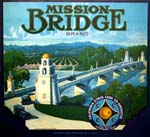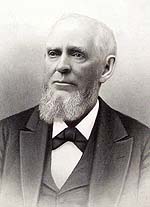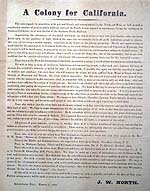
Historical Scrap Book:
RIVERSIDE LIBRARIES 1873-1903
 .
.
John Wesley North.
founder of the Southern California Colony Association.
Photo courtesy of
the Riverside Public Library.
The City of Riverside grew out of the Southern California Colony Association organized by Judge John. W. North. He was born in 1815 in Sand Lake, New York, in a family devoted to the ideas of John Wesley, founder of the Methodist Church. Young North finished Cazenovia Theological Seminary, New York, but never entered the ministry. He continued his studies at Wesleyan University in Middletown, Connecticut, where he actively engaged in activities of anti-slavery movement. The rest of his life he was devoted to the ideals of the temperance movement, community building, and improvement of society (Moses 1985, p. 34).
After years of building the frontier communities in Minnesota and Nevada and a disappointing experience in post-bellum Knoxville, Tennessee, Judge North decided to try again in California. In 1870, he wrote the circular “A Colony for California” calling for “all good industrious people” to join him “to form a colony of intelligent, industrious, and enterprising people so that each one’s industry will help to promote his neighbor’s interests as well as his own.” The colony would have a town “in a convenient locality so that as many of the subscribers as possible can reside in the town and enjoy all the advantages that a first-class town affords. We expect to have schools, churches, lyceum, public library, reading room, etc., at a very early day.”
The idea was to form a temperance colony, free of saloons and communitarian in design. However, these ideas did not survive the hard reality and only five years after the founding, a banker S. C. Evans bought a controlling interest in the Southern California Colony Association and replaced Judge North as its president. From then on, the philosophy of the utopian idealism was replaced with cold commercial efficiency, but the colony otherwise remained true to its sober and reformer origins.
As advertised in a circular, the first colonists made every effort to establish schools, a library, and churches as soon as possible. The first school was erected in 1871, the first church in 1872 and the first library in 1873. Actually, the first library was Judge North’s own parlor in his house on Vine Street, on the eastern edge of Mile Square, as the downtown Riverside became known. In 1873, a group of citizens put together a small book collection and put it in the local schoolhouse. This satisfied the needs of Riverside until 1879, when Elmer W. Holmes and Albert S. White, decided to organize a subscription library. James H. Roe, local journalist, became the volunteer librarian.
The tax-supported Riverside Public Library was formally established in July 9, 1888, with Mary Montague Smith as its first librarian. Until the end of the century, the library moved a few times around town and steadily grew. In 1902, with Grace L. Mansfield as the head librarian, the Riverside Public Library received a $20,000 Carnegie grant to build its own building with the entrance on Seventh Street (today Mission Inn Avenue) and bordered by Orange, Lime and Sixth Street. In 1965, this beautiful mission revival style building was replaced by new building with a capacity of 300,000 volumes. Through time, the simple town library as envisioned by Judge North, grew to the city library system with five branches, offering a variety of library and community services.
For more information about the history and development of the Riverside Public Library one can read:
Ronald J. Baker
Serving through partnership: A centennial history of the Riverside City and County Public Library 1888-1988.
Riverside: Riverside City and County Public Library, 1988.
Loc Hist R 027.4794 BAK
Check the
Riverside Local History Resource Center
Contact William Swafford, Local History Librarian, at (951) 826-5736.
RIVERSIDE PUBLIC LIBRARY
for more information about current library services, books or branches.
This web site was developed as the Library History Assignment
for the History of Books and Libraries class
of SJSU School of LIbrary and Information Science
Text, design, and digital imaging by Vlasta Radan.
Last update May 4, 2006.

